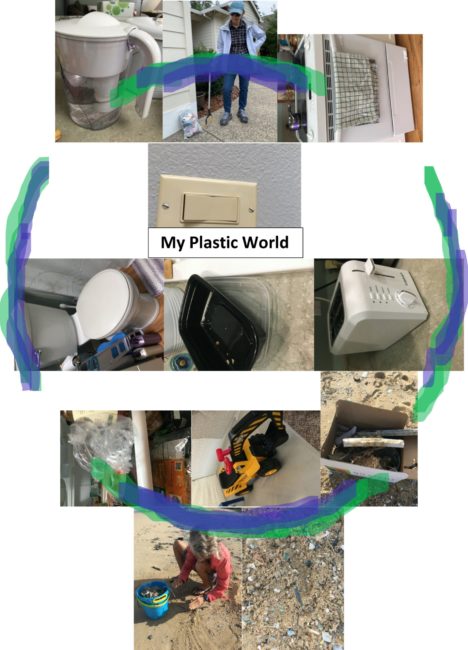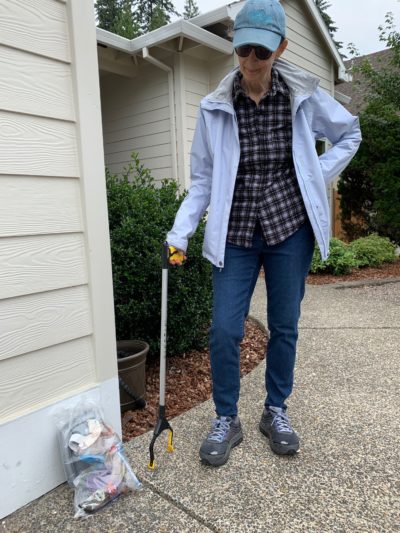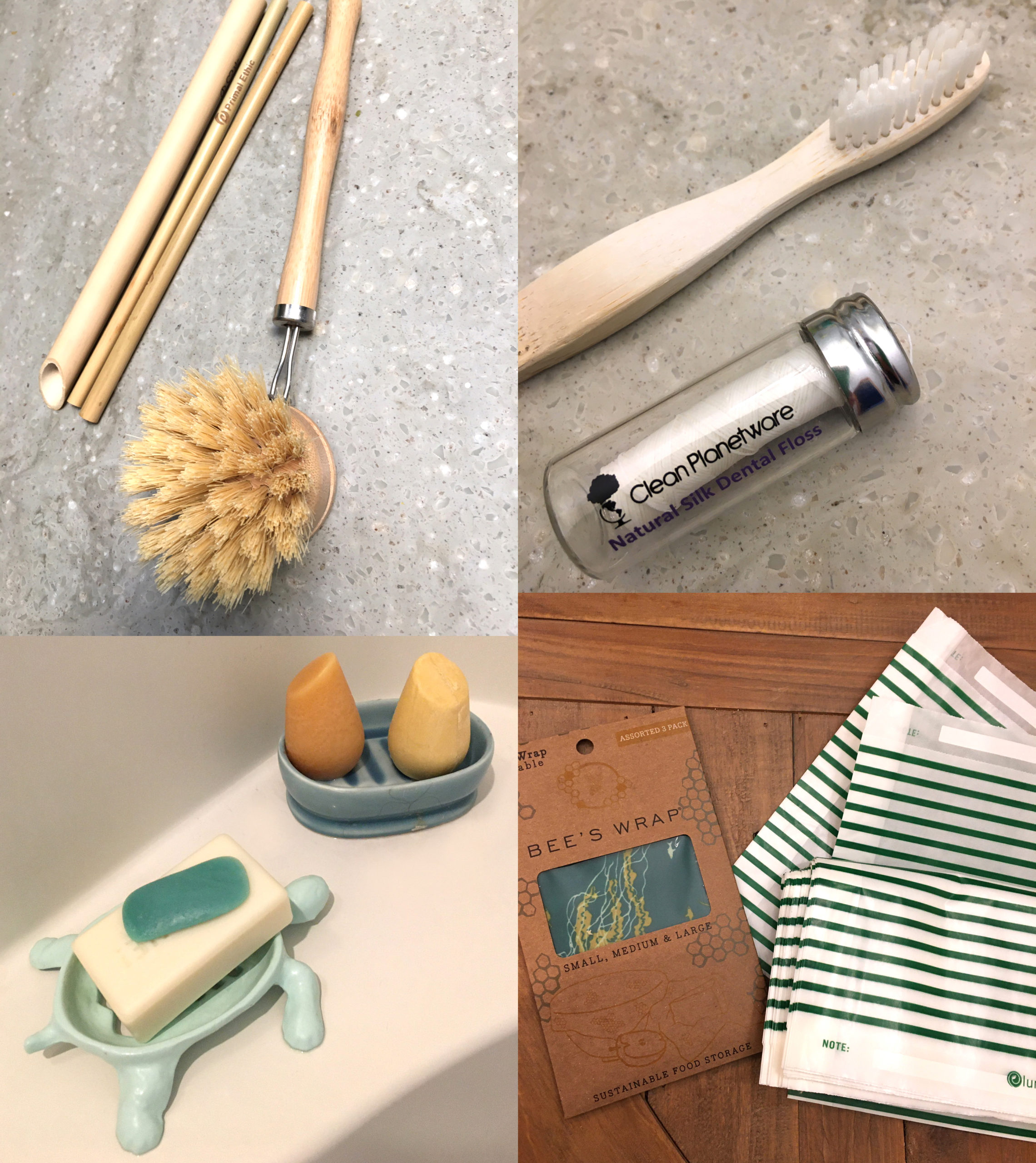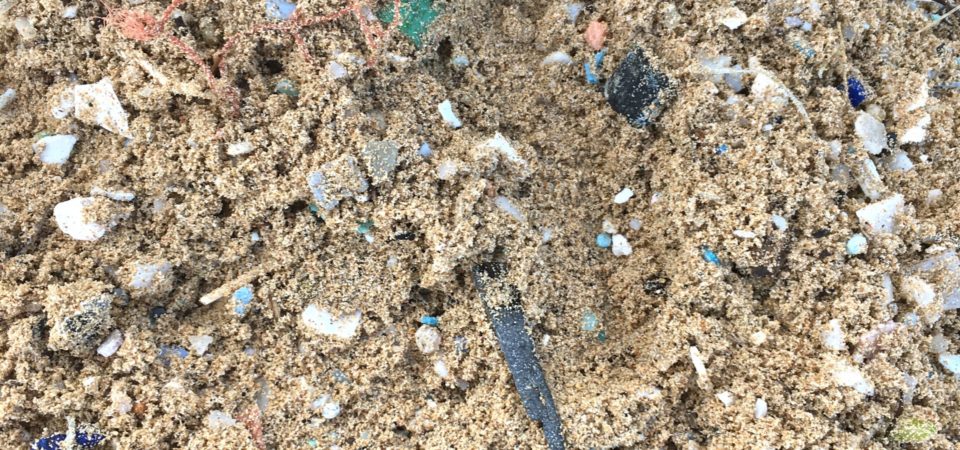Photo Marianne Bickett © 2021
Last summer, I was determined to reduce the use of plastics in our home. As I considered the task ahead, I began to realize I needed a strategy. First, I would assess the amount of plastic in the structure of our house. Next, I would see what could be replaced or reused/repurposed. And last, I would buy fewer things that needed to be thrown away or recycled. Our recycling centers are overburdened, and recycling plastic has many limitations. My intention was to work through each tier of plastic use and then write this article to share my experiences.
We literally live in a plastic world. At times, I’ve felt like swimming upstream against a torrent of something we’ve created that has gotten out of hand. I realized from the start that preaching to others is of little use. The best strategy for us became clear: model the choices and be kind. I understand the defensiveness of many people about making changes, especially right now during a pandemic. I get it. We’re all stressed; the problem of plastic seems to pale against the Coronavirus. When the pandemic began, I watched a video by a doctor who declared (paraphrased): “Now is not the time to worry about using plastic.” He was referring to the plastic bags he was using in his demonstration. I was horrified to hear his words. I believe he, and many others, are missing the point.
From my vantage point, plastic is a big part of the overall problem that includes the pandemic. Our thoughtless discarding of waste into our oceans and rivers, our blatant denial about the unsustainable way we are living (fossil fuels, recycling that can’t work at the current level, illegal wildlife trade, overpopulation) has brought us to the brink of disaster.
The fact that plastic is derived from oil, from the very thing that is directly related to climate change, makes our addressing the problem urgent. And the fact that “the nation’s largest oil and gas companies…have known …all along that most plastic can’t or won’t ever be recycled…” (#BigOilKnew) spurs me on to do what I can to be a part of the solution, not the problem. We’ve been duped into thinking recycling was the answer, but it’s clear it is not. The Big Oil companies must be held accountable; but, I believe we are in a crisis that begs us all to reconsider how we live. We still need to take responsibility for the problem and do our part, as well as demand the oil companies take responsibility for their horrendous lies and deceit over the years.

How much plastic do we have in our house? In our garage? In our yard and in our cars? Let me tell you, after this phase, it was a challenge not to get depressed. There is plastic in nearly everything, from our refrigerator, coffee pot, lids of our toilets, to the very clothes on our backs. Do you know that polyester is derived from plastic? When I searched for a definition of polyester, I learned that it is comprised of synthetic fibers made from a kind of polymer, PET, which is, in essence, plastic. I don’t care for the idea of the clothing I wear being created out of something that can’t biodegrade easily. It just feels wrong.
Plastic was invented to make our lives easier, and it has. It’s malleable, fitting into a plethora of molds, and thick and strong, yet it can be flexible and hollow. When plastic was first invented, it seemed an answer to industry’s prayers. You can do anything, and make anything, with plastic.
The various definitions of the word plastic all focus on its ability to be molded and made three-dimensional. The medical field (and hence all of us) has definitely benefitted from the invention of plastic in IV tubes and bags to tools and materials that can be discarded instead of autoclaved.
Plastic has made hospitals more sanitary. So, I am not advocating all plastic use must be stopped. It’s just gotten out of control. Too much of a good thing is too much of a good thing.
We recently bought a lovely new home, and I was saddened by all the plastic I began to notice embedded in the structure of the house. The things I noticed are not unique at all to our new abode. Without a doubt, every home I’ve ever lived in had the same components. Every home in every neighborhood in every city, for example, most likely has plastic light fixtures and switches, plastic heat dials on the stove, the microwave has many plastic parts, and my husband informed me our new Prius has lots of plastic inside. It came to my attention that this first level of plastics are things we buy rarely or infrequently. They are things that, like our house and car, we use for many years. I don’t think it’s necessary to go on, but I soon understood the first level of awareness is vital to comprehend the immensity and the insidious nature of the problem. I had no idea that I’ve been living in that degree of plastic most of my life.
Without awareness, we cannot begin to solve the problem. We have choices when it comes to buying homes and cars, but finding one completely devoid of plastic? Not so easy. We were delighted, however, when we found we could make a clear choice when it came to buying new beds. After lengthy research, we settled on Saatva beds and bedding, and we have been delighted with the quality of their non-toxic, biodegradable, non-plastic products. They even sent every item in boxes that had no plastic tape! I commend Saatva and other companies striving to create healthy products that are sustainable on every level. These big-time items that we buy rarely/occasionally need to be changed at the manufacturing level. We have brilliant young minds emerging into the work force. Hire clever engineers to create non-toxic, and renewable-biodegradable materials that can do the same job as plastic but with far less damage. We can voice our concerns by doing extra product research and choosing sustainable products that are plastic free, and we can write to manufacturers, urging them to do better.
The next tier is plastic dishes, and cups and other household items. The power of choice is more apparent here. These are items we buy infrequently, like my favorite water boiler. I love it. It was given to me as a gift a few years ago and not doubt it will last a long time. That is the conundrum. From the plastic kitchen stool that I’ve had for over ten years as well to many other plastic items (soap dishes, sippy-cups and so forth) they are designed to last a long time. Many of them will last for hundreds of years. It’s sobering to realize that my former toothbrushes will out-live me by a disturbingly long time. Another pollutant most people don’t think about is acrylic paints. I know my good-intentioned artist friends who still use acrylics may not realize it has microplastic in it. Please, if you use acrylic paints, consider a less toxic alternative. Many paints like watercolor and oils have ingredients that are carcinogenic. Note the website at the end of this article that offers eco-friendly earth safe paints. As artists, we need to consider our materials when we express our truths. As the Buddhist saying goes: Do No Harm.
At first, I was going to get rid of every plastic item in our house. Purge it and then feel better. But no. I’ve heard the saying, “There is no away.” That is in reference to throwing things “away.” I’ve also heard recycling centers cannot handle the volume of plastic they receive everyday. Plastic can only be recycled a couple of times. The triangle sign on plastic bags, for example, is misleading. As I learned, there are many types of plastic and only certain ones can be recycled easily (see the chart at the end of this article). In our community, they will not take
plastic bags, nor the plastic container shells from fast food places or from grocery stores. Those types of plastics gum up the machines. Reusing and repurposing this tier of plastics will help keep plastic out of trash, recycling centers, and our streams and oceans. That leads us to the next level of plastics where I feel we can make a difference every day.
 The last line of the battle is drawn in an area where I feel is the biggest part of the dilemma. Plastic bags, straws, utensils, plates, bread bags, Styrofoam products, drinking cups, wrappings and the long list of other plastic-made products are where I think we must make choices every day to stop using. These are things we buy often. These are the items we’ve found most abundantly during our daily trash collecting and when we do creek clean ups. We find these things in school yards and shopping center parking lots and gutters and…on and on. And, it is the unnecessary use of plastic that concerns me. For example, I bought some colored chalk for my grandson last month. It arrived in a plastic-wrapped box and each, individual row of chalk was wrapped in plastic. Really? I’ve bought wooden toys for our grandson and they’ve arrived wrapped in unrecyclable plastic. The irony doesn’t escape me.
The last line of the battle is drawn in an area where I feel is the biggest part of the dilemma. Plastic bags, straws, utensils, plates, bread bags, Styrofoam products, drinking cups, wrappings and the long list of other plastic-made products are where I think we must make choices every day to stop using. These are things we buy often. These are the items we’ve found most abundantly during our daily trash collecting and when we do creek clean ups. We find these things in school yards and shopping center parking lots and gutters and…on and on. And, it is the unnecessary use of plastic that concerns me. For example, I bought some colored chalk for my grandson last month. It arrived in a plastic-wrapped box and each, individual row of chalk was wrapped in plastic. Really? I’ve bought wooden toys for our grandson and they’ve arrived wrapped in unrecyclable plastic. The irony doesn’t escape me.
I have learned to read carefully before buying online. I bought a toaster that I didn’t realize had plastic on the outside. So much for trusting photos and skimming through the details! During the pandemic, I’ve had to order things I would never have ordered through the computer. Packaging became a nightmare. I’ve contacted businesses that use plastic bubbles and materials and requested they use only paper products if padding is necessary. Even though it is time consuming, reaching out to companies, stores, and other venues in regard to their choices of packing materials and packaging is very important.
As of this summer, I am enjoying my shampoo/conditioner bars and a nice iron-made soap dish in the form of a sea turtle. We switched to bamboo toothbrushes with bristles made from biodegradable coconut fibers. For many years, I’ve used food wrap made from paper or wax, cloth shopping bags, laundry baskets that are really baskets, and any metal and wood- made products when possible. Our kitchen compost bin is made of metal, and our new outdoor compost bin is made from recycled plastic and metal. Even dental floss causes environmental hazard, so switching to pure silk floss/bamboo was easy. Talk with your dentist and urge them to recommend sustainable dental products. I also stopped using those plastic dental pics that I started using a couple years ago when a dentist recommended them. Using wooden scrubbing brushes and plant-based pads for the kitchen has been very doable. Laundry detergent sheets seem to be working very well, our clothes are sparkling clean. A local grocery store has a hand soap refill station, so I will use that instead of buying new large bottles.

We always look for alternatives to plastic packaging. Buying loose fruits and vegetables instead of prepackaged is very helpful. However, I struggle with the plastic bags used for bread and other grain products. Whenever I can, I buy bread in paper bags, but it’s not always available. On a positive note, today I discovered women’s cotton, washable underwear that doubles as sanitary napkins. Wow.
When I buy things like pots for my yard, for example, I consciously choose clay pots and raised beds made of wood. Like so many people these days (a very happy sign), home gardening is a renewed interest of ours. And our grandson loves to help grandpa push the old-fashioned hand powered lawn mower around our miniscule lawn. This may not be directly related to plastic, but
we feel good it is all metal and we don’t use a gas mower. Our former electric mower had numerous plastic parts. We switched to native landscaping years ago and will do so again as we transform our new yard. Reducing plastic use is a part of a larger connection to taking care of our earth. It’s a big piece of a very interrelated pie.
When you look at the horrific pollution of plastic alone, doing nothing is guaranteeing our demise. It’s in our food chain. Plastic has been found in our blood. Science News magazine reported recently that tiny fish larvae off the coast of Oahu are eating plastic residue.
Is there enough love for our planet, for our children and grandchildren, to fill our hearts with desire to do something? What will it take? We are in a multidimensional crisis. Covid-19 is just one of the threads that leads to the fact that we must live sustainably. Plastic is one thing that we really can do something about each day. In our family, we have a long-ways to go yet. But each day, we do our best.
The slogan: Refuse, Reduce, Reuse, Recycle is helpful in terms of the most beneficial choice to the least. I know we’ve all been trained that recycling is good. But we’ve come to rely on an antiquated system that is unable to keep up with the volume of recycling that comes in every day. So, first, refuse to buy plastics, that’s it! If that’s not completely possible, reduce the amount of plastics you use. Then, by all means, reuse your plastic materials as much as possible. Instead of saying Recycle, I am going to say, please stop buying plastic whenever possible. We can’t rely on recycling anymore. Thanks to my friend Rose for reminding me, too, that reusing goes for things like clothes and books. We can start with addressing the plastic problem, but sustainable living covers all materials and things we consume daily, weekly, monthly, yearly, and on and on.
In a recent Ocean Conservancy blog I read by Nick Mallos, it states that the plastic pollution in our oceans will triple by 2040. But it doesn’t have to happen. Don’t be fooled, our everyday choices really do make a difference. If we all do the little things, the results could be very big.
NOTES / More Information
From @ecofootprintearth on Instagram, July 2020: Recycling labels, what they mean:
1 PET: easy to recycle. Found in soda bottles, water bottles, salad dressing containers, peanut butter jars. Picked up by most recycling programs.
2 HDPE: easy to recycle. Found in milk jugs, detergent bottles, shampoo bottles, shopping bags. Picked up by most recycling programs.
3 PVC: difficult to recycle. Found in piping, children’s toys, garden hoses, chemical containers, outdoor furniture. Rarely ever recycled, try to upcycle instead.
4 LDPE: difficult to recycle. Found in grocery bags, bread bags, squeezable bottles, six pack rings. Not often recycled at curbside, check with collector
5 PP: sort of easy to recycle. Found in yogurt cups, straws, hangers, bottle caps, chip bags. Picked up by most curbside recycling but check to be sure.
6 PS: difficult to recycle. Found in Styrofoam to-go boxes, disposable cutlery, packing peanuts, egg cartons. Rarely ever recycled, avoid at all costs.
7 Other: difficult to recycle. Found in CDs, baby bottles, cart parts, sunglasses, nylon. Not often picked up at curbside, check with collector.
Companies I discovered that offer Plastic-free choices to name only a few:
EcoFootprint Earth
Saatva Beds
Brush with Bamboo.com
Hibar bar shampoos and conditioners
Free the Ocean kitchen supplies
Uncle Harry’s Natural Toothpaste
ModiBodi women’s underwear
NetZero Company
Here’s a website for eco-friendly, plastic free paints: Natural Earth Paint.
And a website for more plastic free information: The Last Plastic Straw.
#BigOilKnew : Article about big oil and plastic mentioned.
Thanks to: Plastic Free July, Treading My Own Path, Say No to Plastics, Global Guardian Project and more, all found on Instagram.
Special Thanks to: my friends, Rose Shank and Michele Guieu, for feedback and helpful information; and to my son, Jacques, and husband, Brian, for their editing and input.
 Marianne received her Master’s in Art Education in 1986 from the University of Illinois.
Marianne received her Master’s in Art Education in 1986 from the University of Illinois.
After retiring from teaching, she created The Magic Art Cart trilogy (2016). Marianne’s next book is Art á la Cart, a memoir (Sunbury Press). She is married to composer Dr. Brian Belét.
The MAHB Blog is a venture of the Millennium Alliance for Humanity and the Biosphere. Questions should be directed to joan@mahbonline.org

